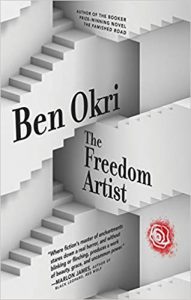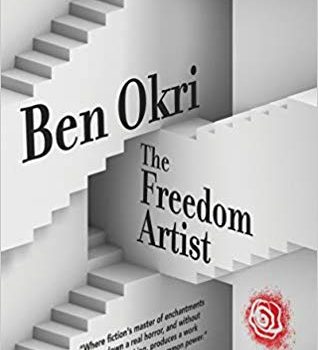Ian Mond Reviews The Freedom Artist by Ben Okri
 The Freedom Artist, Ben Okri (Head of Zeus 978-1788549592, 14.99, 368pp, hc) February 2019. (Akashic Books 978-1617757914, $30.95, 336pp, hc) February 2020.
The Freedom Artist, Ben Okri (Head of Zeus 978-1788549592, 14.99, 368pp, hc) February 2019. (Akashic Books 978-1617757914, $30.95, 336pp, hc) February 2020.
Sometimes it feels like all anyone is publishing these days is dystopian fiction. I get why. As I write, Boris Johnson has just won a landslide election victory in the United Kingdom assuring a hard-Brexit and further cuts to the country’s social welfare system; in Australia, the Liberal/National Government is planning to introduce a Religious Discrimination Bill into Parliament with an explanatory memo straight out of The Handmaid’s Tale, and in the United States Donald Trump… continues to be Donald Trump. This swing to the right in the “developed world” – especially post 2016 – has not only seen the dystopia change in character – what was once a cautionary tale is now foreshadowing the inevitable – but has also led to a glut of novels. To prove my point, three of the four books I’m reviewing this month – Ben Okri’s The Freedom Artist, Anne Charnock’s Bridge 108 and Gish Jen’s The Resisters – feature dystopias shaped by climate change and reactionary politics.
Ben Okri begins his dystopian allegory The Freedom Artist with the ontological conceit, “written in the oldest legends,” that “all are born in a prison.” It’s a founding myth that is initially accepted as a cornerstone of society, but eventually forgotten over time (“Their civilisations became so successful… they began to think they were free”). Everything changes when a cry of triumph is heard on the edge of the desert, heralding that “someone had escaped the prison of the world.” Soon after, a radical and disruptive version of the founding myth – “it was not the earth or the universe that was the prison, it was the body” – emerges, infecting the populace and leading to civil unrest spurred on by graffiti sprayed across buildings, buses, and billboards emblazoned with the question: WHO IS THE PRISONER? The establishment (known as The Hierarchy) crack down like every other authoritarian regime throughout history, by burning books, imprisoning publishers and booksellers, and destroying all forms of printing. Amid these oppressive conditions, where all knowledge is banned, where people scream in their sleep, where the environment has been devastated, and where the rich have taken over the world, we follow a boy, Mirababa, and a man, Karnak, both of whom have individually undertaken a dangerous quest for the truth. In the case of Mirababa, he is initiated as a mythmaker following the death of his grandfather, through a vision-quest of sorts where he comes to comprehend the nature of the prison. Karnak, on the other hand, is searching for the love of his life, Amalantis, who one morning is disappeared into a van – like many thousands before her – for daring to ask about the prisoner.
Up until writing this review, I was unaware that The Freedom Artist had been published in the UK twelve months ago. This caught me off guard, not because I’m an avid of fan of Okri’s fiction – I’m embarrassed to admit that The Freedom Artist is my first taste of his work – but because as someone who won the Booker back in 1991 for The Famished Road (the first Nigerian to do so), I’d expect the publication of a new Ben Okri novel to come with a certain amount of buzz and attention. But a quick skim of the Google-machine suggests that Okri has been on the nose with critics for close to two decades, reaching its nadir when, in 2014, he “won” the Literary Review‘s Bad Sex In Fiction Award for a love scene in The Age of Magic. Reviews for The Freedom Artist in the UK have been decidedly lukewarm, with The Telegraph’s Claire Allfree calling the book a “silly dystopia” that you’d have to be high to enjoy.
While I liked The Freedom Artist more than Allfree, in striving for profundity Okri often over-reaches. His desire to mix and match creation myths and parables from across the world leads to a nebulous mush of New-Agey concepts such as the infinite light that connects all things, or the notion that “before being human, man was a form of light in a circle of gold.” The novel’s heightened, fable-like quality also means that Okri’s world never feels grounded or real. I’m sure this is deliberate, after all The Freedom Artist is an allegory, but it does mean I struggled to care about the characters. As an example, despite Okri’s best efforts to flesh out Karnak’s relationship with his wife via several flashbacks, Amalantis is so perfect, so ethereal (“they argued all day and not once did she raise her voice. When she was most annoyed she sounded most gentle.”) that I was never invested in Karnak’s search for her.
And yet, I couldn’t help but be entertained by The Freedom Artist. It has all the naïve boldness of a debut novel, an author throwing a kitchen sink of ideas at the page to see which ones will stick. Some are bizarre, such as the novel’s dizzying lurch toward horror as the Hierarchy, out of desperation, unleash a special force of cannibals wearing jackal masks (yes, you read that correctly) to gobble down any dissidents. But when the ideas do land, they are tremendous. There’s the wailing contagion that spreads across the world and causes people to burst into tears for no apparent reason. There’s Karnak’s moving encounter with the terminally ill, all of whom are enjoying their last moments because they know they have nothing to lose: “[Karnak] had never seen such merriment, never heard such laughter, such free expression of feelings and language.” And there are the writers who spend their days endlessly recording every death, dream, disappearance, and moment of joy. “They write with all the passion of their lost tribe. They capture what technology cannot see, record what technology cannot feel. They are the last dreamers.” This here is the heart of The Freedom Artist: a deep appreciation of literature, storytelling, and flights of the imagination; a condemnation of the tendency to dumb down great works of art; and the overriding message that true freedom can be found in the pages of a book.
Ian Mond loves to talk about books. For eight years he co-hosted a book podcast, The Writer and the Critic, with Kirstyn McDermott. Recently he has revived his blog, The Hysterical Hamster, and is again posting mostly vulgar reviews on an eclectic range of literary and genre novels. You can also follow Ian on Twitter (@Mondyboy) or contact him at mondyboy74@gmail.com.
This review and more like it in the February 2020 issue of Locus.
 While you are here, please take a moment to support Locus with a one-time or recurring donation. We rely on reader donations to keep the magazine and site going, and would like to keep the site paywall free, but WE NEED YOUR FINANCIAL SUPPORT to continue quality coverage of the science fiction and fantasy field.
While you are here, please take a moment to support Locus with a one-time or recurring donation. We rely on reader donations to keep the magazine and site going, and would like to keep the site paywall free, but WE NEED YOUR FINANCIAL SUPPORT to continue quality coverage of the science fiction and fantasy field.







